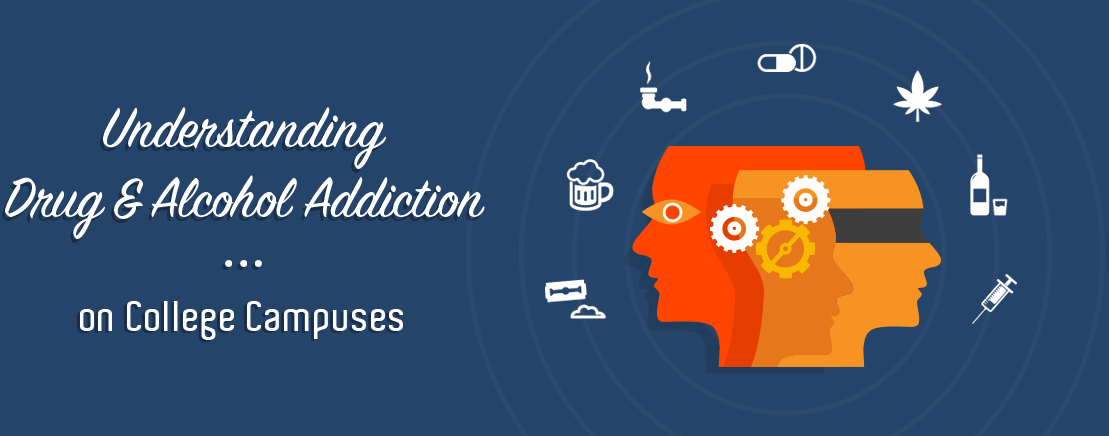Meet the Expert

Kayla Greenhalge
Kayla is an entrepreneur with a passion for helping people overcome their addictions. After having been an addict herself, she decided she wanted to give back to those still struggling. Her expertise includes: Drug Addiction, Drug Abuse, ACOA, Meditation, DRT, law reform for non-violent drug offenders, overcoming grief, the 12 steps, NA, AA, plus more.
Going away to college is a huge leap for many. It is definitely an exciting, yet scary chapter in life for young adults. High school graduates are often still discovering themselves and unfortunately turn to drugs and alcohol to alleviate stress, social anxiety, and to even fit in with a certain crowd. Not only are young adults susceptible to substance abuse due to external influences; young adults can alter their brain chemistry permanently, kicking off a cycle of substance abuse and addictive behaviors due to the introduction of illicit chemicals to the underdeveloped brain. What may start off as casual drinking can easily turn into addiction if not controlled properly. With that said, this CollegeStats.org guide is designed to inform college students about dependencies and addiction on a general level and provide tips on how to avoid getting trapped into unhealthy habits.
Why Do Students Turn to Drugs?
There are numerous reasons why students do drugs in college. Drug abuse can be attributed to a variety of factors, such as:
Curiosity: College is the time where many students are living away from home for the first time and surrounded by others who are in the same situation. With that said, it's only natural that college students are curious and hold strong desires to try new things and explore what's out there. In the midst of self-exploration, it's common that students experiment with drugs.
Peer Pressure: Students in college may not completely know themselves yet. In fact, many are just getting to know themselves and developing their character. It's only natural that they feel peer pressure to fit into a specific crowd. Students in Greek life for example, may be constantly surrounded by other people experimenting with recreational or performance-enhancing substances. This may lead them to try these drugs for themselves as well.
Stress: In addition to attending classes, students have an abundant amount of classwork and exams to attend to. College can be a very stressful time in a person's life. Students dealing with high demands of coursework, social obligations, part-time jobs, and other personal things may turn to drugs as a way to cope and "de-stress."
A Closer Look at Dependencies & Addiction
Chemical
Also known as substance abuse, chemical dependency refers to the usage of drugs and/or alcohol regardless of negative consequences. Examples of negative consequences that can come as a direct result of substance abuse are:
- Failure to go to school or work
- Risking one's own life in a dangerous situation (i.e. driving while drunk or high)
- Legal issues including but not limited to theft & drug charges
- Interference of personal relationships with friends & family
Chemical dependency has been classified as a medical brain disorder that involves the abuse of substances, both legal and illegal. While certain substances like alcohol and cigarettes are legal, they can easily be abused and pose negative risks and impacts in one's life. Other drugs like heroin, methamphetamine, and cocaine are illegal but are also often abused by college students and more.
Think you might be or know someone who is dependent on drugs and/or alcohol? Here are some things to ponder to see whether professional help is needed:
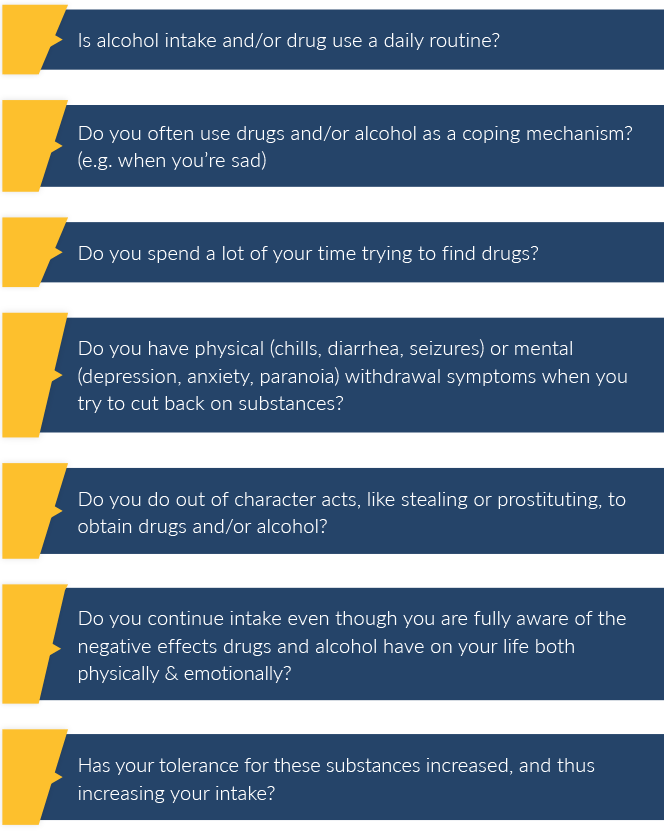
If you have answered ‘yes' to any of these, then it may be time to get help. Luckily, help is available to those who seek for it and want to recover. There are detoxification programs out there to help patients with uncomfortable withdrawal symptoms, and inpatient drug treatment to encourage a healthy recovery. You do not have to be addicted to drugs or alcohol for life; rather, you can choose the alternative and learn new ways to live a happy and fulfilling life.
Drugs
Many students are bound to experiment with drugs at least once in their college lifetime. Some substances that are frequently abused are:
- Cocaine
- Opiates
- Hallucinogens
- Inhalants
- Methamphetamine
- Marijuana
- Prescription medicines
- Pain relievers like OxyContin
- Over-the-counter medicines like cold medicine
- Ecstasy
- Adderall
What is the appeal of drugs to college students?
In social settings, students may enjoy smoking marijuana recreationally with other friends. Other common drugs like ecstasy, cocaine, and heroin can provide a desirable high for some. Not only do students use these drugs in attempt to improve their social lives, but also to essentially escape reality and the stresses that come with being a college student.
On the other hand, Adderall is known as the "study drug" because it provides students with a heightened sense of motivation and concentration. As a result, people are convinced that it helps their performance on classwork and exams. While this all sounds great, drugs like adderall have its negative effects as well. For example, students are at risk for depression, loss of appetite, headaches, insomnia, irritability, low blood pressure, rapid mood swings, and dry mouth, to name a few.

Personally, Adderall was my "Gateway Drug". I was in a dual-engineering program and did not have the time nor the energy to complete everything (while adding a minor in biomedical engineering). Adderall turned into cocaine.
Alcohol heightens the effects of any drugs… and also lowers inhibitions so you will WANT to try illicit drugs. Over a very short time I spiraled into an addiction to "more". Couple this with a staggering fear of reality coming from a sheltered home where I was focused on my academics and athletic programs… you have yourself a true addict. My mind was chemically altered from my use and abuse of substances and my psyche took a huge hit. Depression kicked in after 5 years and it was the choice between getting help and jumping in front of a train." ....
"This is the reality that faces college students"
Over the counter drugs can also pose a risk among college students. Being easily obtained, over the counter drugs such as robitussin are becoming more commonly used among this age group. Not only do they not require a prescription, they are often able to be hidden, so signs of substance abuse stay behind closed doors as well.
Alcohol
Alcohol has been a long-standing concern on college campuses all around the world. According to a 2009 survey by the National Institutes of Health, four out of five college students drink at least occasionally. Additionally, 40% of college students have admitted to binge drinking regularly.
To put things into perspective, we have gathered some useful statistics from the National Institute of Alcohol Abuse & Alcoholism regarding drinking in the college setting:
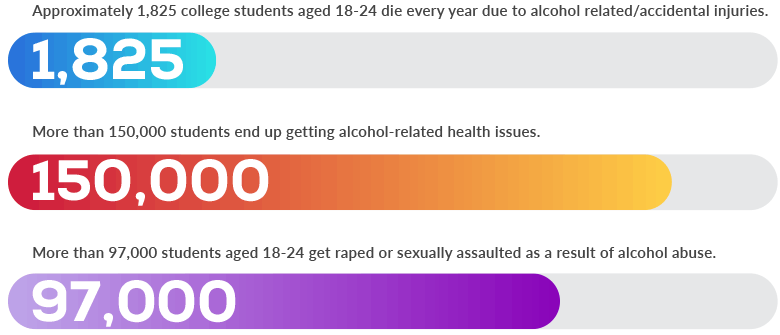
Why do college students drink?
Binge drinking is defined as the act of drinking excessively in a short period of time with the intention of getting intoxicated, or "drunk." There are many reasons why students enjoy the act. Not only can it help them fit into a crowd that they would like to please, it also helps to erase social anxieties and inhibitions. Some even find that drinking helps to alleviate stress associated with classwork and exams, even if only temporarily. Students involved in the Greek life may find the party scene attractive, and unfortunately, it often includes a lot of alcohol intake. Aside from the typical obligations that come with the college life, students may also be fighting other battles such as failed relationships, family problems, and more. Drinking alcohol may help students escape reality and cope with depression or other negative feelings associated with their personal problems.
College students are also infamous for mixing alcohol into their energy drinks. Energy drinks provide a good boost of energy that sleep-deprived students may need to get through the day. However, at social events, they can drink a couple of energy drinks with alcohol. Contrary to belief, this mix is a lot more dangerous than just consuming alcohol alone. While the caffeine in energy drinks act as a stimulant boosting the heart rate, alcohol does the exact opposite and slows down the heart rate. These conflicting actions confuse the body, and can lead to heart-related problems, exhaustion, and speech and walking difficulties. According to the United States Food & Drug Administration, there are 13 deaths associated with the consumption of energy drinks.
What are the risks associated with alcohol?
There are many risks to drinking. It can be as forgiving as a hangover, or it can lead to death. Students in the past have reported that their grades have dropped as a result from missing class, falling behind on classwork, and failing exams as a result of irresponsible drinking.
Drinking alcohol, especially in a public setting, can have other negative consequences. Some common ones that students often experience include slurred speech, dizziness, paranoia, seizures, blurry vision, impaired judgment, unprotected sex, injuries, assault, sexual abuse, and driving under the influence. Because alcohol can skew judgment, it can lead to people making poor decisions that could potentially cost them more than just a one-time consequence.
The Road to Recovery
The road to recovery starts with a person being aware of their problem and wanting to change for the better. There are a number of strategies for change, though it may not be easy. We all know that abusing drugs and alcohol has many negative consequences. So, it's always a good idea to start cutting back on drinking and taking drugs and instead, adopting a healthier lifestyle earlier rather than later.
What can I do to adopt a healthier lifestyle?
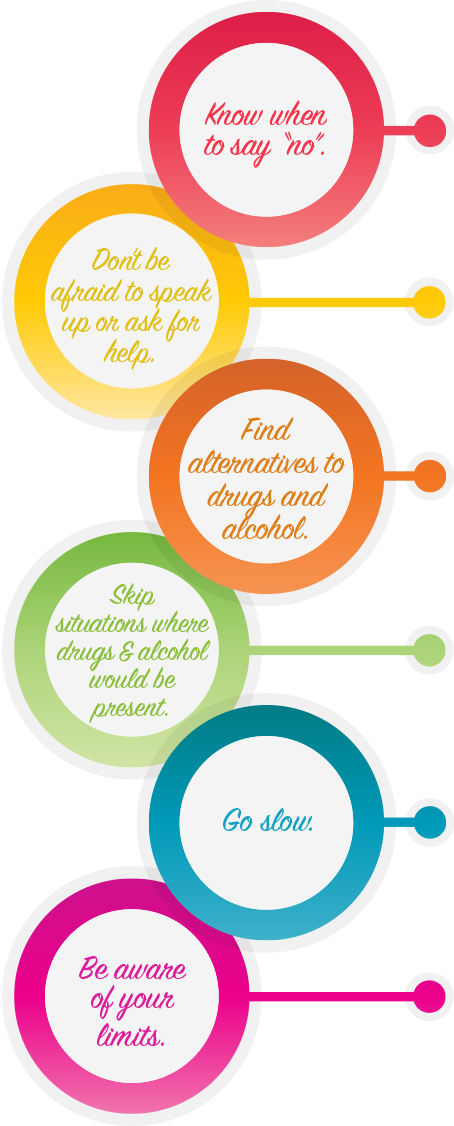
Know when to say "no".
Saying "no" is really the first step to recovery. Self-control is important to staying firm with your decision on cutting back or quitting drugs/alcohol.
Don't be afraid to speak up and ask for help.
There are plenty of resources available for professional help. This can be difficult for many, but muster up the courage to ask for help, you may be surprised at how quickly you can get it! The sooner the better.
Find alternatives to drugs and alcohol.
College can be a very stressful time for many. Luckily, drugs and alcohol are not the only answer. There are healthier alternatives such as engaging in a mind-calming activity like yoga or Pilates, or choosing to release stress through cardio like a morning run. Others like to read a book of leisure. There are many other hobbies you can pick up that are great for relieving stress as well like learning a new musical instrument, blogging, and even switching up your work/study space.
Skip situations where drugs & alcohol would be present.
Temptation is your worst enemy when it comes to trying to cut out any negative behavior. By skipping situations where drugs and alcohol are present, you are basically saying "no" to them without actually having to face someone and possibly feel guilty of saying it.
Go slow.
If you must drink, drink in increments rather than downing a lot at once and avoid drinking on an empty stomach since it gets absorbed into the body a lot quicker if there is no food.
Be aware of your limits.
There is nothing wrong with the very occasional drinking here and there, so long as you are aware of your limits and know when to stop. There is a difference between ending up at the emergency room and falling asleep peacefully on your own bed after a long night.
Staying Safe & Responsible
Okay, maybe you decided you had a long week and went out to party with a few friends. I mean, we’re all human here, right? Drinking too much is a common problem in college and while it’s not preferable to drink beyond your limits, it’s important to know what to do in the event that you already did. As you may already know, excessive drinking can pose dangerous risks and consequences. With that said, here are some tips for getting you home safe without danger to yourself or those around you.
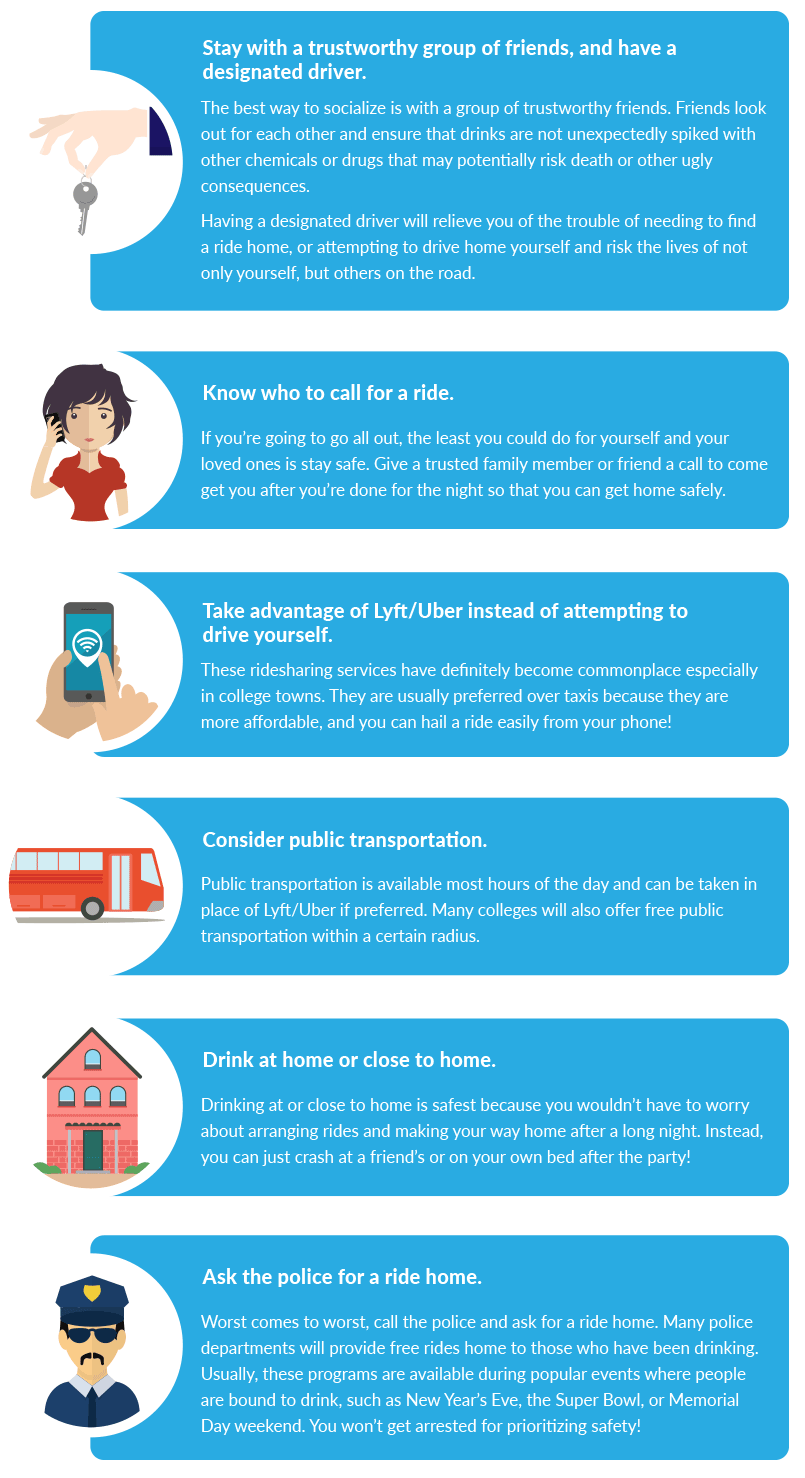
As college students transition into adulthood, it's very normal to experiment with different things, including drugs and alcohol. The key to addiction prevention is being aware of the consequences beforehand so that you can still make informed decisions and be smart about it. Some signs of a drug addiction requiring medical attention may include behavioral changes, weight loss, rapid mood swings, and change in sleeping habits. Luckily, there are many resources available for recovery. Students can engage in treatments like meditation, yoga, massage therapy, or even join support groups and 12-step programs to get back on track. Once you recognize your problem, it's time to take the necessary steps toward recovery.
Helpful Resources
If you're looking for other helpful resources to help you familiarize with dependencies/addiction these websites below will come in handy:
- Addiction Center: See plenty of treatment options and additional addiction resources, and get your questions asked regarding rehab.
- National Institute of Drug Abuse: Receive a wealth of information relevant to those in college, including discussion on stimulants and marijuana.
- Rethinking Drinking: Not sure if alcohol is becoming a problem in your life? Find out using the resources on this website. You'll be able to find out what to do to cut back or find medical help.
- National Institute of Alcohol Abuse & Alcoholism: Looking for more information on alcohol abuse? This website has it all!
- Substance Abuse and Mental Health Services Administration: Offers a variety of resources for substance abuse and mental health.
- Behavioral Health Treatment Services Locator: Find Alcohol, Drug and Behavioral Health treatment centers around the country.

